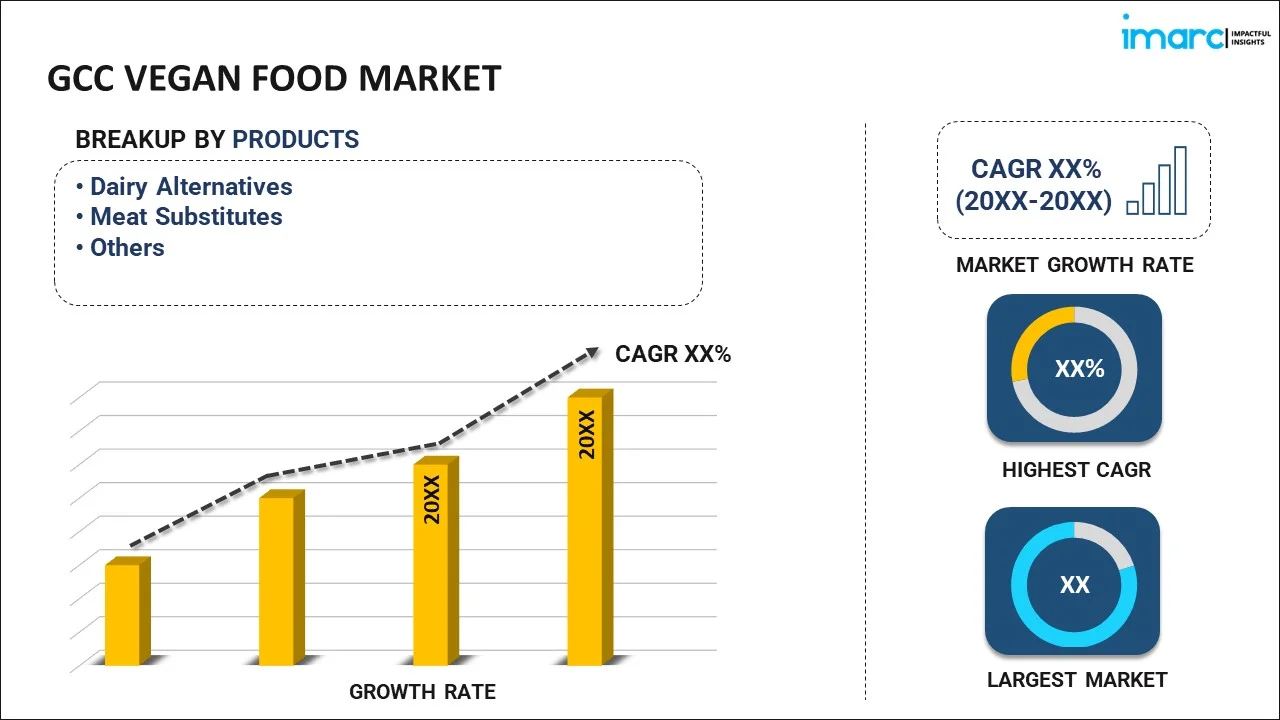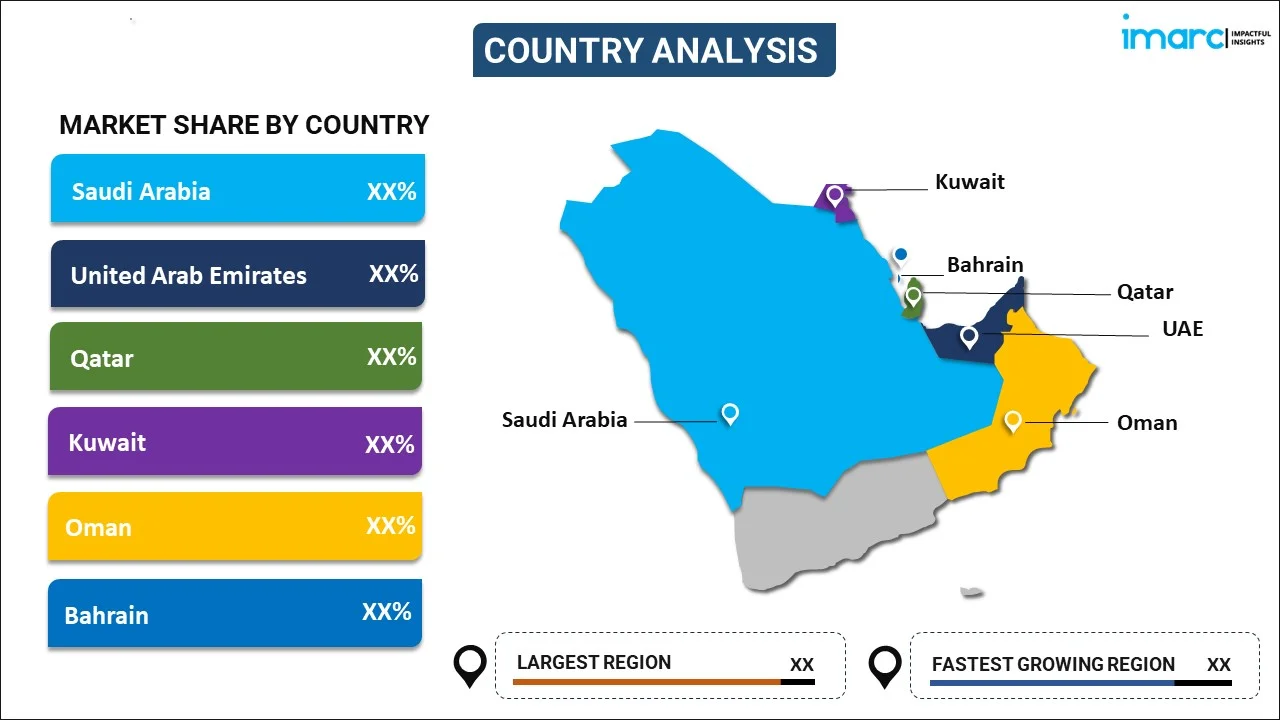
GCC Vegan Food Market Report by Product (Dairy Alternatives, Meat Substitutes, and Others), Source (Almond, Soy, Oats, Wheat, and Others), Distribution Channel (Supermarkets and Hypermarkets, Convenience Stores, Specialty Stores, Online Stores, and Others), and Country 2026-2034
Market Overview:
The GCC vegan food market size reached USD 420.4 Million in 2025. Looking forward, IMARC Group expects the market to reach USD 1,101.0 Million by 2034, exhibiting a growth rate (CAGR) of 11.29% during 2026-2034. The growing awareness among individuals regarding the benefits of vegan food, the development of innovative plant-based alternatives, and the implementation of government initiatives to promote healthy eating represent some of the key factors driving the market.
|
Report Attribute
|
Key Statistics
|
|---|---|
|
Base Year
|
2025
|
|
Forecast Years
|
2026-2034
|
|
Historical Years
|
2020-2025
|
|
Market Size in 2025
|
USD 420.4 Million |
|
Market Forecast in 2034
|
USD 1,101.0 Million |
| Market Growth Rate 2026-2034 | 11.29% |
Access the full market insights report Request Sample
Vegan food is a dietary choice that excludes all animal products, such as dairy, meat, eggs, and other animal-derived ingredients. Individuals who follow a vegan diet consume plant-based foods, which include several fruits, vegetables, grains, legumes, nuts, seeds, and plant-based alternatives, are embraced for various reasons, including ethical concerns about animal welfare, environmental considerations, and potential health benefits. It is rich in essential nutrients such as fiber, vitamins, minerals, and antioxidants, contributing to well-being. Plant-based protein sources, including beans, lentils, tofu, and quinoa, replace the protein traditionally obtained from animal sources. Additionally, fortified plant-based products such as almond milk and fortified cereals help ensure adequate intake of nutrients, including calcium and vitamin B12 commonly found in animal products. The production of plant-based foods needs few resources and generates fewer greenhouse gas (GHG) emissions than animal agriculture. As a result, vegan food is gaining immense traction among individuals as a sustainable dietary choice, positively impacting the environment across the gulf cooperation council (GCC) region.
GCC Vegan Food Market Trends:
The market is primarily driven by the growing number of health-conscious consumers across the region. In addition, the increasing awareness of several benefits led to the adoption of vegan food for healthier lifestyles and improved well-being, thus influencing market growth. In line with this, the incorporation of plant-based diets provides health benefits such as lower cholesterol levels, better digestion, and weight management, thus contributing to market growth. Moreover, several advancements in food technology led to the development of sophisticated plant-based alternatives that closely mimic the taste and texture of animal-based products, appealing to consumers seeking alternatives without compromising on taste which represents another major growth-inducing factor. Besides this, the easy availability of several vegan products, including meat alternatives, dairy-free options, and plant-based snacks, allows consumers to explore different flavors and cuisines while adhering to their dietary choices, thus accelerating market growth. Along with this, the changing consumer preferences led to the widespread availability of vegan food options in restaurants, cafes, and food companies by creating innovative and delicious plant-based dishes, making veganism more appealing to consumers, thus propelling market growth. Apart from this, the implementation of several government initiatives to promote healthy eating and sustainability with educational efforts and raise awareness about the benefits of veganism and its potential positive impact on health and the environment are augmenting the market growth. In line with this, the increasing popularity of celebrities and social media influencers showcasing vegan lifestyles are essential in popularizing veganism and driving consumer interest in plant-based foods, thus providing a positive thrust to market growth. Furthermore, the rise in health and wellness trends, including fitness, clean eating, and mindful consumption, led to the widespread adoption of vegan food, thus creating a positive market outlook.
GCC Vegan Food Market Segmentation:
IMARC Group provides an analysis of the key trends in each segment of the GCC vegan food market report, along with forecasts at the regional and country levels for 2026-2034. Our report has categorized the market based on product, source, and distribution channel.
Product Insights:

To get detailed segment analysis of this market Request Sample
- Dairy Alternatives
- Cheese
- Desserts
- Snacks
- Others
- Meat Substitutes
- Tofu
- Texturized Vegetable Protein (TVP)
- Seiten
- Quorn
- Others
- Others
The report has provided a detailed breakup and analysis of the market based on the product. This includes dairy alternatives (cheese, desserts, snacks, others), meat substitutes (tofu, texturized vegetable protein (TVP), Seiten, Quorn, and others), others.
Source Insights:
- Almond
- Soy
- Oats
- Wheat
- Others
A detailed breakup and analysis of the market based on the source has also been provided in the report. This includes almonds, soy, oats, wheat, and others.
Distribution Channel Insights:
- Supermarkets and Hypermarkets
- Convenience Stores
- Specialty Stores
- Online Stores
- Others
A detailed breakup and analysis of the market based on the distribution channel has also been provided in the report. This includes supermarkets, and hypermarkets, convenience stores, specialty stores, online stores, and others.
Country Insights:

To get detailed regional analysis of this market Request Sample
- Saudi Arabia
- UAE
- Qatar
- Bahrain
- Kuwait
- Oman
The report has also provided a comprehensive analysis of all the major markets, which include Saudi Arabia, the UAE, Qatar, Bahrain, Kuwait, and Oman.
Competitive Landscape:
The report has also provided a comprehensive analysis of the competitive landscape in the market. Competitive analysis such as market structure, key player positioning, top winning strategies, competitive dashboard, and company evaluation quadrant has been covered in the report. Also, detailed profiles of all major companies have been provided.
GCC Vegan Food Market Report Coverage:
| Report Features | Details |
|---|---|
| Base Year of the Analysis | 2025 |
| Historical Period | 2020-2025 |
| Forecast Period | 2026-2034 |
| Units | Million USD |
| Scope of the Report | Exploration of Historical and Forecast Trends, Industry Catalysts and Challenges, Segment-Wise Historical and Predictive Market Assessment:
|
| Products Covered |
|
| Sources Covered | Almond, Soy, Oats, Wheat, Others |
| Distribution Channels Covered | Supermarkets and Hypermarkets, Convenience Stores, Specialty Stores, Online Stores, Others |
| Countries Covered | Saudi Arabia, the UAE, Qatar, Bahrain, Kuwait, Oman |
| Customization Scope | 10% Free Customization |
| Post-Sale Analyst Support | 10-12 Weeks |
| Delivery Format | PDF and Excel through Email (We can also provide the editable version of the report in PPT/Word format on special request) |
Key Questions Answered in This Report:
- How has the GCC vegan food market performed so far and how will it perform in the coming years?
- What has been the impact of COVID-19 on the GCC vegan food market?
- What is the breakup of the GCC vegan food market on the basis of product?
- What is the breakup of the GCC vegan food market on the basis of source?
- What is the breakup of the GCC vegan food market on the basis of distribution channel?
- What are the various stages in the value chain of the GCC vegan food market?
- What are the key driving factors and challenges in the GCC vegan food market?
- What is the structure of the GCC vegan food market and who are the key players?
- What is the degree of competition in the GCC vegan food market?
Key Benefits for Stakeholders:
- IMARC’s report offers a comprehensive quantitative analysis of various market segments, historical and current market trends, market forecasts, and dynamics of the GCC vegan food market from 2020-2034.
- The research study provides the latest information on the market drivers, challenges, and opportunities in the GCC vegan food market.
- Porter's five forces analysis assist stakeholders in assessing the impact of new entrants, competitive rivalry, supplier power, buyer power, and the threat of substitution. It helps stakeholders to analyze the level of competition within the GCC vegan food industry and its attractiveness.
- Competitive landscape allows stakeholders to understand their competitive environment and provides an insight into the current positions of key players in the market.
Need more help?
- Speak to our experienced analysts for insights on the current market scenarios.
- Include additional segments and countries to customize the report as per your requirement.
- Gain an unparalleled competitive advantage in your domain by understanding how to utilize the report and positively impacting your operations and revenue.
- For further assistance, please connect with our analysts.
 Request Customization
Request Customization
 Speak to an Analyst
Speak to an Analyst
 Request Brochure
Request Brochure
 Inquire Before Buying
Inquire Before Buying




.webp)




.webp)












